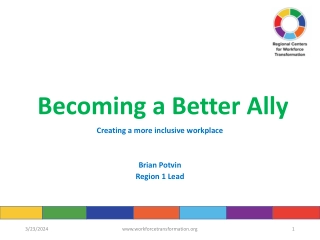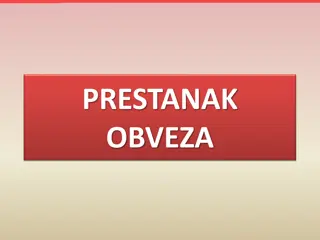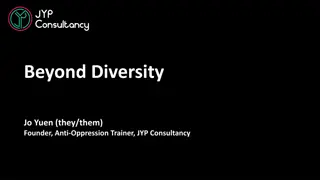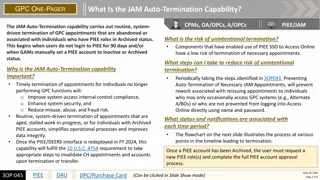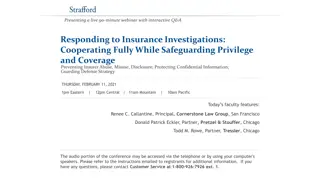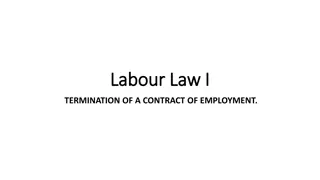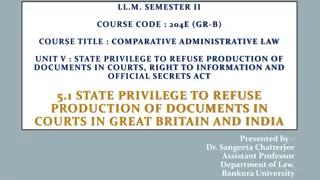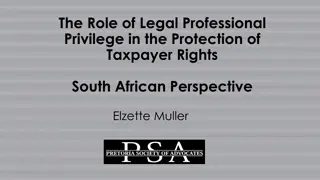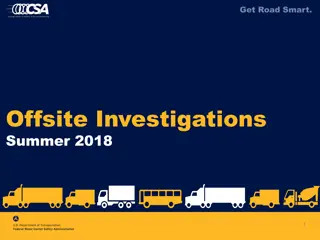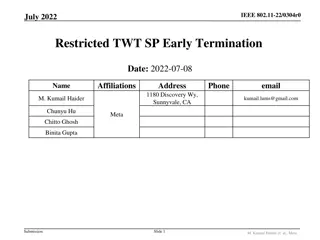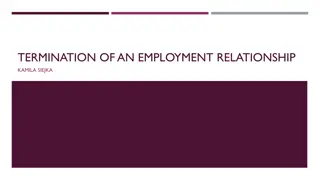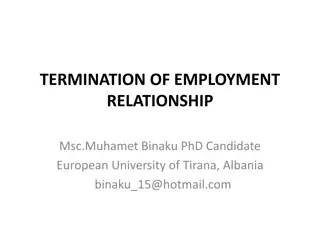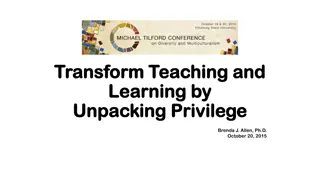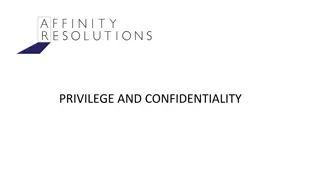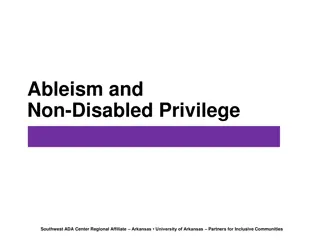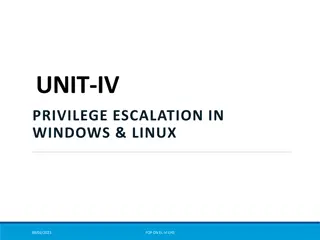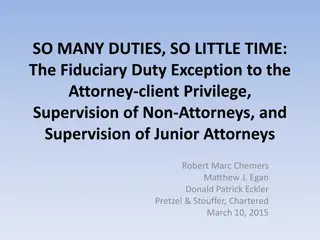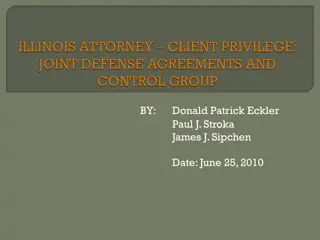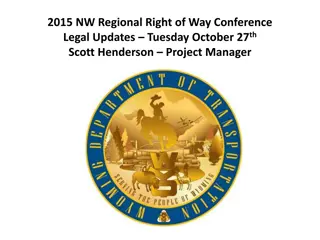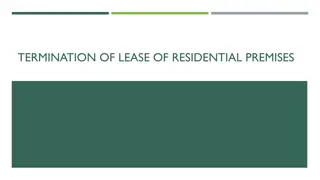Understanding Legal Privilege in Investigations and Pre-termination Negotiations
This content delves into recent developments in the law of privilege, highlighting the types of privilege such as legal professional privilege, litigation privilege, and without prejudice privilege. It explains working definitions of legal advice privilege and litigation privilege, emphasizing communication criteria and purposes. Furthermore, it discusses the post Three Rivers litigation scenario and recent decisions on internal investigations regarding employee interviews by external lawyers.
Download Presentation

Please find below an Image/Link to download the presentation.
The content on the website is provided AS IS for your information and personal use only. It may not be sold, licensed, or shared on other websites without obtaining consent from the author. Download presentation by click this link. If you encounter any issues during the download, it is possible that the publisher has removed the file from their server.
E N D
Presentation Transcript
Secreting the evidence: investigations, privilege and pre-termination negotiations Patrick Halliday Patrick Halliday 14 May 2018
Recent developments in law of privilege 1. Internal investigations: are interviews of employees by external lawyers privileged? 2. Litigation privilege: are documents created for investigations by regulators covered? 3. Iniquity exception: is privilege disapplied when lawyer gives advice in furtherance of (a) unlawful team move and/or (b) discrimination?
Relevant types of privilege Legal professional privilege: Legal advice privilege Litigation privilege Without prejudice privilege
Working definitions Legal advice privilege: (1) communication (2) between client and lawyer (3) made in confidence (4) for purposes of giving or receiving legal advice Litigation privilege: (1) communication (2) between client & lawyer or client & 3P or lawyer and 3P (3) when litigation reasonably in prospect (4) with sole or dominant purpose of obtaining legal advice or preparing for adversarial litigation Without prejudice privilege: communications for purposes of attempting to settle an existing dispute
Legal advice privilege: post Three Rivers litigation Applies only to communications between lawyer and identified client ; does not apply to communications between lawyer and third party, or between client and third party Applies to legal advice widely construed, including presentational advice
Legal advice privilege: recent decisions on internal investigations Three first instance decisions over last year or so: Astex Therapeutics Limited v Astrazeneca [2016] EWHC 2759 (Ch);In re RBS Rights Issue [2017] 1 WLR 1991; andSFO v ENRC [2017] EWHC 1017 (QB) Where client is a corporation, an employee is the client only if authorised to seek and receive legal advice Hence interviews of employees by external lawyers during course of internal investigations not covered employees authority to give information to lawyers insufficient to make them the client Note that in RBS, Hildyard J left open question of whether there is a further restriction, namely that only those who are part of directing mind of corporation may count as client
Litigation privilege: ENRC again SFO v ENRC [2017] EWHC 1017 (QB) Litigation privilege does not extend to documents created in order to avoid contemplated litigation, but does cover documents created in order to settle litigation is this a workable distinction? Criminal investigation by SFO does not constitute adversarial litigation; it is merely investigative or inquisitorial, so documents created for dominant purpose of SFO investigation are not privileged Criminal prosecution (which is adversarial litigation) was not a real likelihood merely because criminal investigation was on foot . now on appeal to Court of Appeal
The iniquity principle (aka the crime/fraud exception) Advice sought or given for the purpose of effecting iniquity or in furtherance of iniquity is not privileged Principle founded upon public policy: no public policy in favour of lawyers advising on how to commit iniquity Strong prima facie case of iniquity required Key question: what is iniquity ? Historically, crime or fraud ; but it has been broadened .
What counts as iniquity? Helpful synthesis of law in BBGP Ltd v Babcock & Brown Global Partners [2011] Ch 296: Does not apply to all civil wrongs Applies to all forms of fraud and dishonesty such as fraudulent breach of trust, fraudulent conspiracy, trickery and sham contrivances Fraud used in a relatively wide sense High water mark is Barclays Bank Plc v Eustice [1995] 1 WLR 1238: client obtained a lawyer s help in order to enter transactions at an undervalue, in order to prejudice his creditor bank, by trying to take assets out of the creditor bank s reach; held to be sufficiently iniquitous for public policy to require that the communications between him and his solicitor in relation to the setting up of those transactions to be discoverable
The employment context: are unlawful team moves or discrimination iniquity ? Crescent Farm v Sterling[1972] Ch 553: torts of interference with contract and conspiracy held not to be covered by iniquity principle Gamlen Chemical Co (UK) Ltd v Rochem Ltd (unreported), 7 December 1979: Court of Appeal agreed with Goulding J that: For servants during their employment and in breach of their contractual duty of fidelity to their master to engage in a scheme, secretly using the master's time and money, to take the master s customers and employees and make profit from them in a competing business built up to receive themselves on leaving the master's service, I would have thought that commercial men and lawyers alike would say that that is fraud Gamlen followed in Walsh Automation (Europe) Ltd v Bridgeman [2002] EWHC 1344 (QB) (disloyal employees setting up a rival business) Imminent EAT decision on whether discrimination counts as iniquity
Without prejudice privilege: exceptions Uniliver v Proctor & Gamble Proof of settlement agreement Agreement vitiated by fraud, misrepresentation or undue influence Estoppel Explanation of delay/acquiescence Unambiguous impropriety No policy justification for exclusion Costs (where without prejudice save as to costs )
Without prejudice privilege: unambiguous impropriety in employment context BNP Paripas v Mezzotero [2004] IRLR 508 No dispute during grievance process controversial Using WP meeting to discriminate flagrantly is unambiguous impropriety Woodward v Santander [2010] IRLR 834: Discrimination not a special category of impropriety must still be unambiguous
Without prejudice privilege: applying to exclude material Apply early Do not refer to material in pleading Have issue determined before trial at PH


